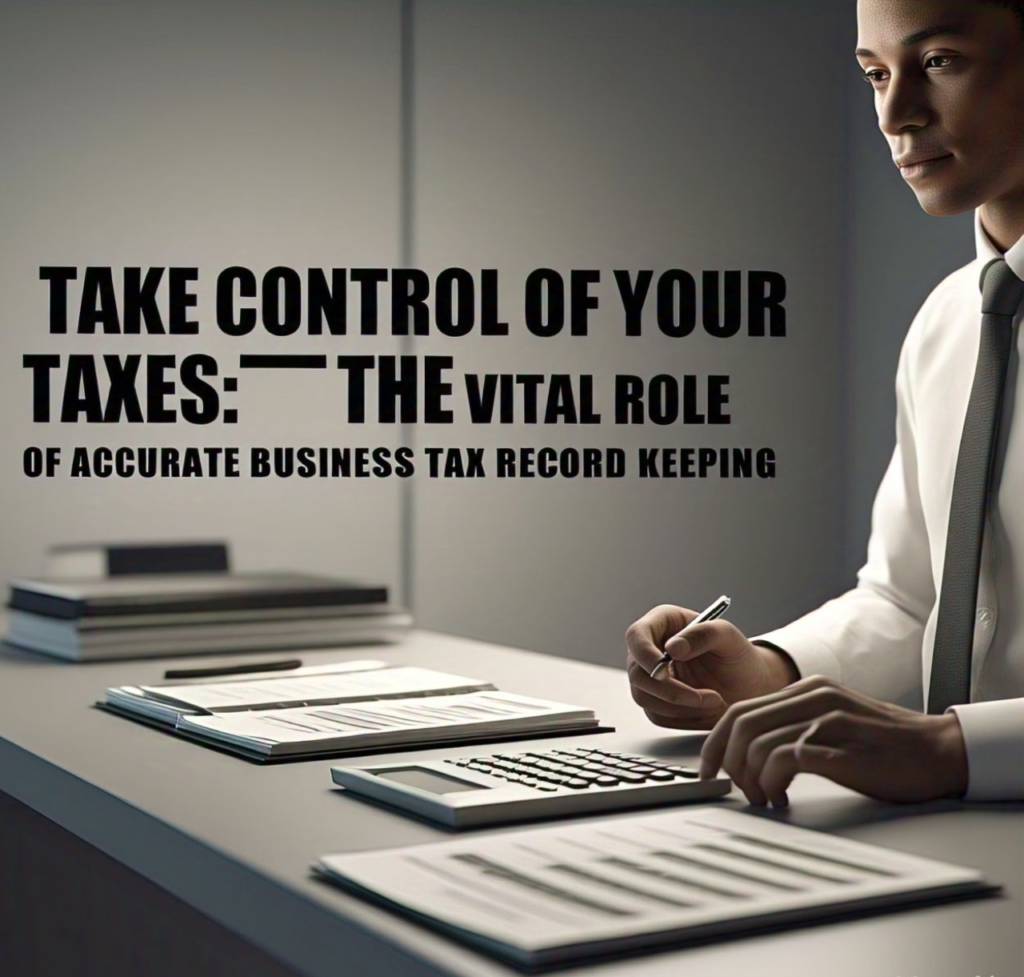TAKE CONTROL OF YOUR TAXES: THE VITAL ROLE OF ACCURATE BUSINESS TAX RECORD KEEPING
As a business owner in Canada, managing your finances effectively is crucial to ensuring the success and sustainability of your enterprise. One critical aspect of financial management is tax record keeping. Accurate and up-to-date records are essential for navigating the complex world of business taxes, avoiding costly errors, and minimizing stress during tax season.
In this comprehensive guide, we’ll delve into the importance of accurate business tax record keeping, explore the benefits of maintaining precise records, and provide practical tips on how to manage your tax records effectively. Whether you’re a seasoned entrepreneur or just starting out, this article will empower you to take control of your taxes and ensure your business remains financially healthy.
THE IMPORTANCE OF ACCURATE BUSINESS TAX RECORD KEEPING
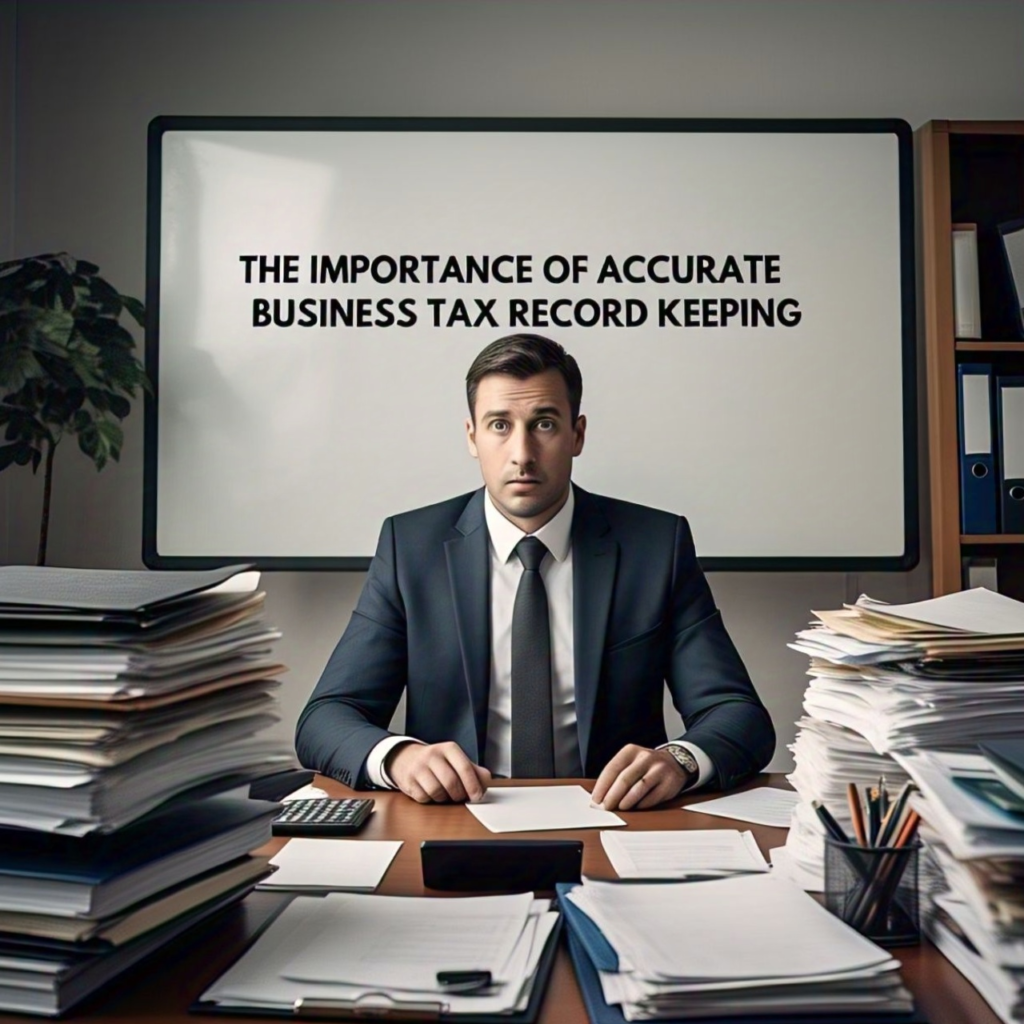
Accurate business tax record-keeping is essential for any business operating in Canada. It’s a critical component of financial management, ensuring compliance with tax laws and regulations, and minimizing the risk of errors or omissions that can lead to costly reassessments.
Maintaining accurate and detailed tax records is vital for several reasons:
1. Compliance with Tax Laws: The Canada Revenue Agency (CRA) requires businesses to keep accurate records of their financial transactions, including income, expenses, and taxes paid. Failure to comply can result in penalties, fines, and even audits.
2. Accurate Tax Returns: Precise records ensure you’re reporting your business income and expenses correctly, reducing the risk of errors or omissions that can lead to costly reassessments.
3. Support for Tax Deductions: Well-maintained records provide the necessary documentation to support your business’s tax deductions, minimizing the risk of disallowed claims.
4. Financial Management: Accurate records enable you to make informed financial decisions, identify areas for cost reduction, and optimize your business’s financial performance.
5. Reduced Risk of Audits: Maintaining accurate records demonstrates your commitment to transparency and accountability, reducing the risk of audits and minimizing the stress associated with them.
CONSEQUENCES OF INACCURATE BUSINESS TAX RECORD-KEEPING
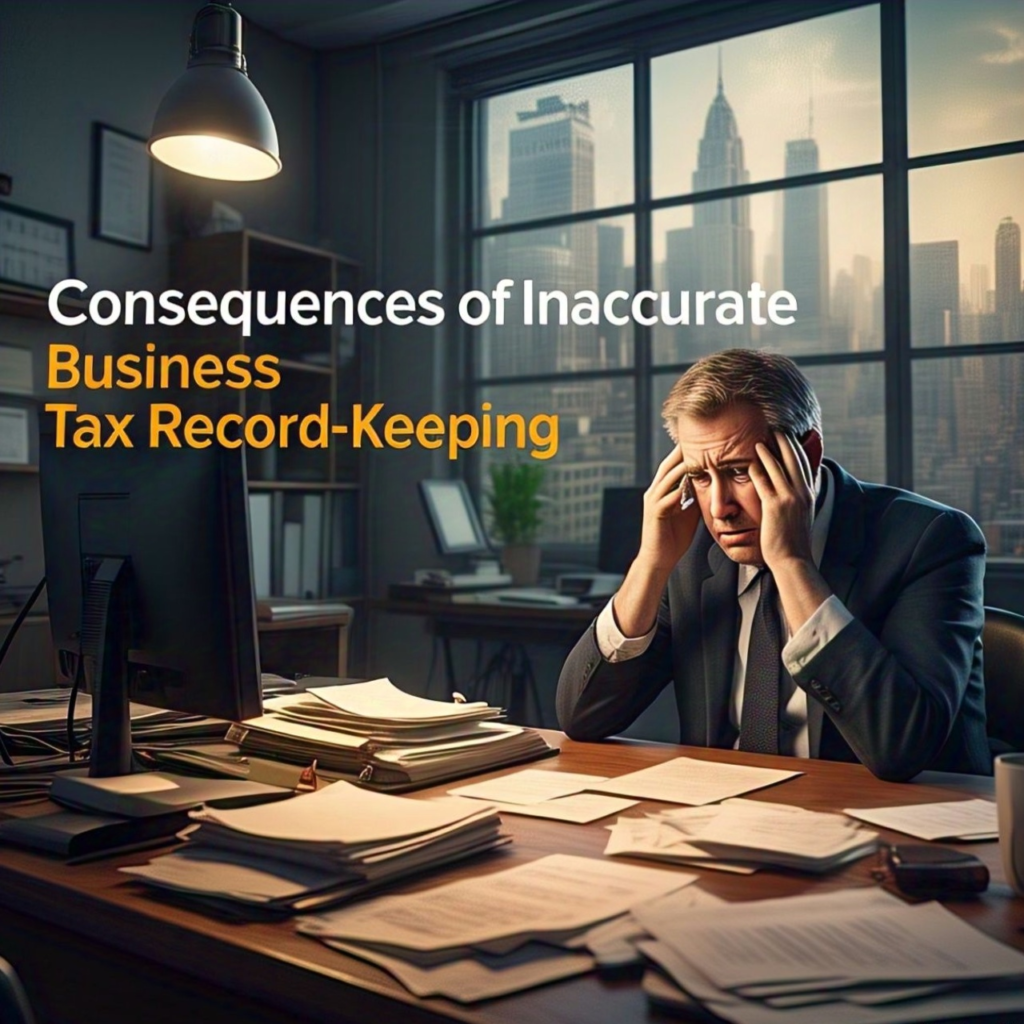
1. Penalties and Fines: Failure to maintain accurate records can result in penalties and fines, which can be costly and damage your business’s reputation.
2. Loss of Tax Deductions and Credits: Inaccurate records can lead to disallowed tax deductions and credits, resulting in a higher tax liability and reduced cash flow.
3. Audits and Reassessments: Inaccurate records increase the risk of audits and reassessments, which can be time-consuming and costly.
4. Damage to Your Business’s Reputation: Failure to maintain accurate records can damage your business’s reputation and erode trust with stakeholders, including investors, lenders, and customers.
BENEFITS OF ACCURATE BUSINESS TAX RECORD KEEPING
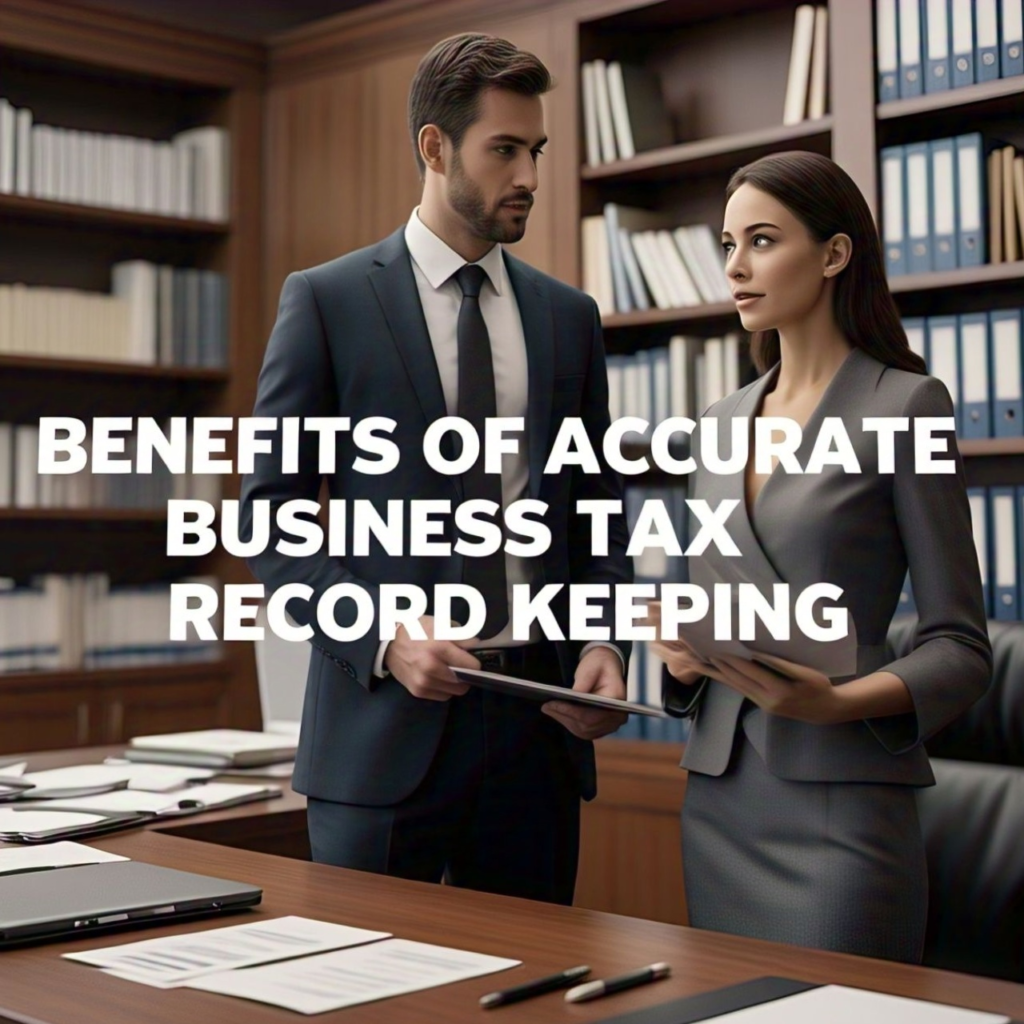
Implementing a robust tax record-keeping system can have numerous benefits for your business, including:
1. Reduced Stress: Accurate records minimize the stress and anxiety associated with tax season, allowing you to focus on your business’s growth and development.
2. Improved Financial Management: Precise records provide valuable insights into your business’s financial performance, enabling you to make informed decisions and drive growth.
3. Increased Efficiency: Streamlined record-keeping processes save time and reduce administrative burdens, allowing you to allocate resources more effectively.
4. Enhanced Credibility: Maintaining accurate records demonstrates your commitment to transparency and accountability, enhancing your business’s credibility with stakeholders, including investors, lenders, and customers.
5. Optimized Tax Strategy: Accurate records enable you to take advantage of available tax deductions and credits, minimizing your tax liability and maximizing your cash flow.
6. Better Decision-Making: Precise records provide valuable insights into your business’s financial performance, enabling you to make informed decisions about investments, expansions, and other strategic initiatives.
7. Improved Cash Flow Management: Accurate records help you manage your cash flow more effectively, ensuring you have sufficient funds to meet your tax obligations and other financial commitments.
8. Reduced Risk of Audits and Reassessments: Maintaining accurate records reduces the risk of audits and reassessments, minimizing the stress and financial burden associated with these processes.
Long-Term Benefits of Accurate Business Tax Record-Keeping
1. Business Growth and Expansion: Accurate records provide a solid foundation for business growth and expansion, enabling you to make informed decisions about investments and strategic initiatives.
2. Increased Profitability: Optimized tax strategies and improved financial management can lead to increased profitability, providing a competitive edge in your industry.
3. Enhanced Business Value: Maintaining accurate records can enhance your business’s value, making it more attractive to potential buyers or investors.
4. Improved Relationships with Stakeholders: Accurate records demonstrate your commitment to transparency and accountability, fostering trust and confidence with stakeholders, including investors, lenders, and customers.
COMMON CHALLENGES AND MISTAKES TO AVOID IN BUSINESS TAX RECORD-KEEPING
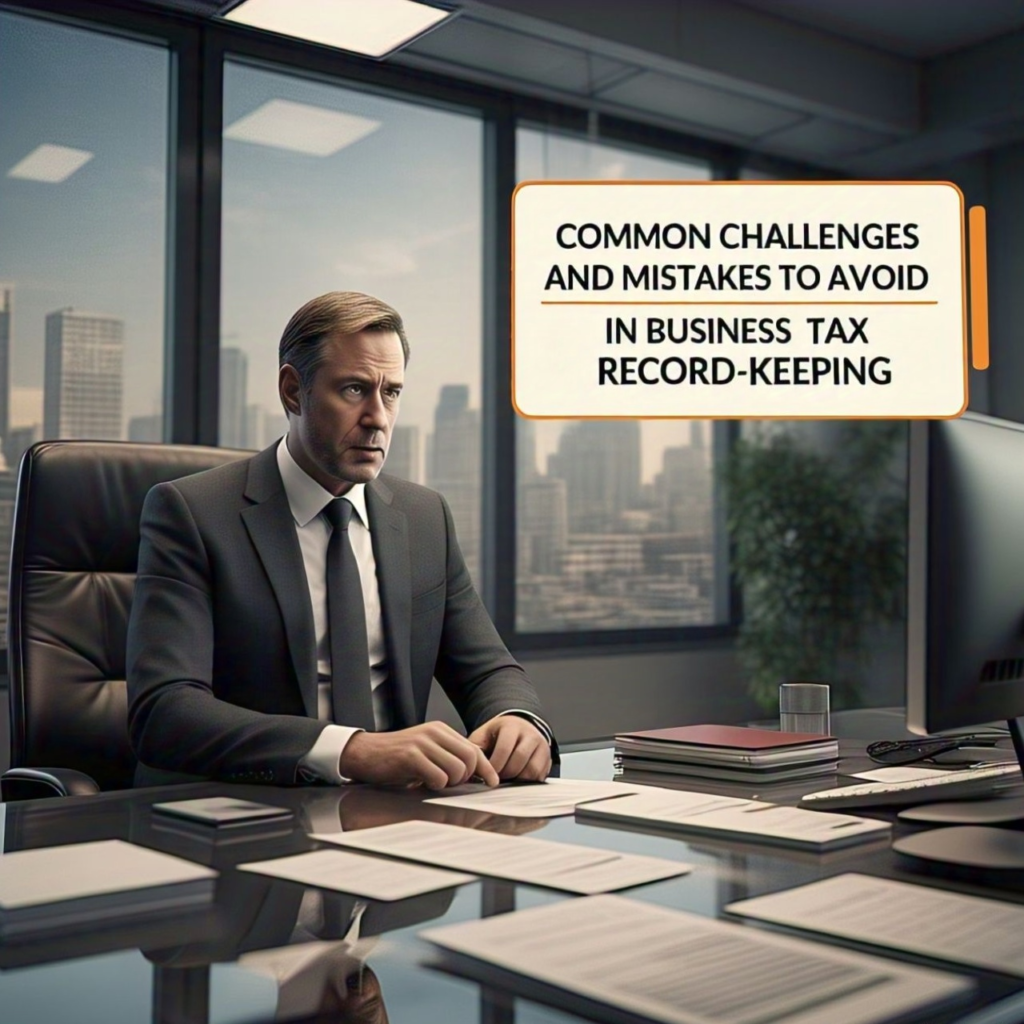
Maintaining accurate and detailed business tax records is crucial for any business operating in Canada. However, many businesses face common challenges and make mistakes that can lead to costly consequences. In this section, we’ll explore the common challenges and mistakes to avoid in business tax record-keeping.
Common Challenges In Business Tax Record-Keeping
1. Inadequate Record-Keeping Systems: Many businesses lack a centralized system for storing and managing their tax records, making it difficult to locate specific documents and increasing the risk of errors.
2. Insufficient Training and Support: Business owners and employees may not receive adequate training and support on tax record-keeping procedures, leading to mistakes and inaccuracies.
3. Time Constraints and Procrastination: Business owners often face time constraints and may procrastinate when it comes to maintaining their tax records, leading to incomplete or inaccurate records.
4. Lack of Organization and Categorization: Failing to organize and categorize tax records can make it difficult to locate specific documents and increase the risk of errors.
Common Mistakes To Avoid In Business Tax Record-Keeping
1. Inaccurate or Incomplete Records: Maintaining inaccurate or incomplete records can lead to costly consequences, including penalties, fines, and audits.
2. Failure to Maintain Supporting Documentation: Failing to maintain supporting documentation, such as receipts and invoices, can make it difficult to support tax deductions and credits.
3. Not Keeping Records for the Required Period: Failing to keep tax records for the required period (typically six years) can lead to costly consequences, including penalties and fines.
4. Not Seeking Professional Advice: Failing to seek professional advice from a qualified tax professional, such as a Canada tax expert or financial advisor in Ontario, can lead to mistakes and inaccuracies.
By being aware of the common challenges and mistakes to avoid in business tax record-keeping, you can take steps to overcome them and maintain accurate and detailed records that support your business’s financial health and growth.
PRACTICAL TIPS FOR MANAGING YOUR TAX RECORDS
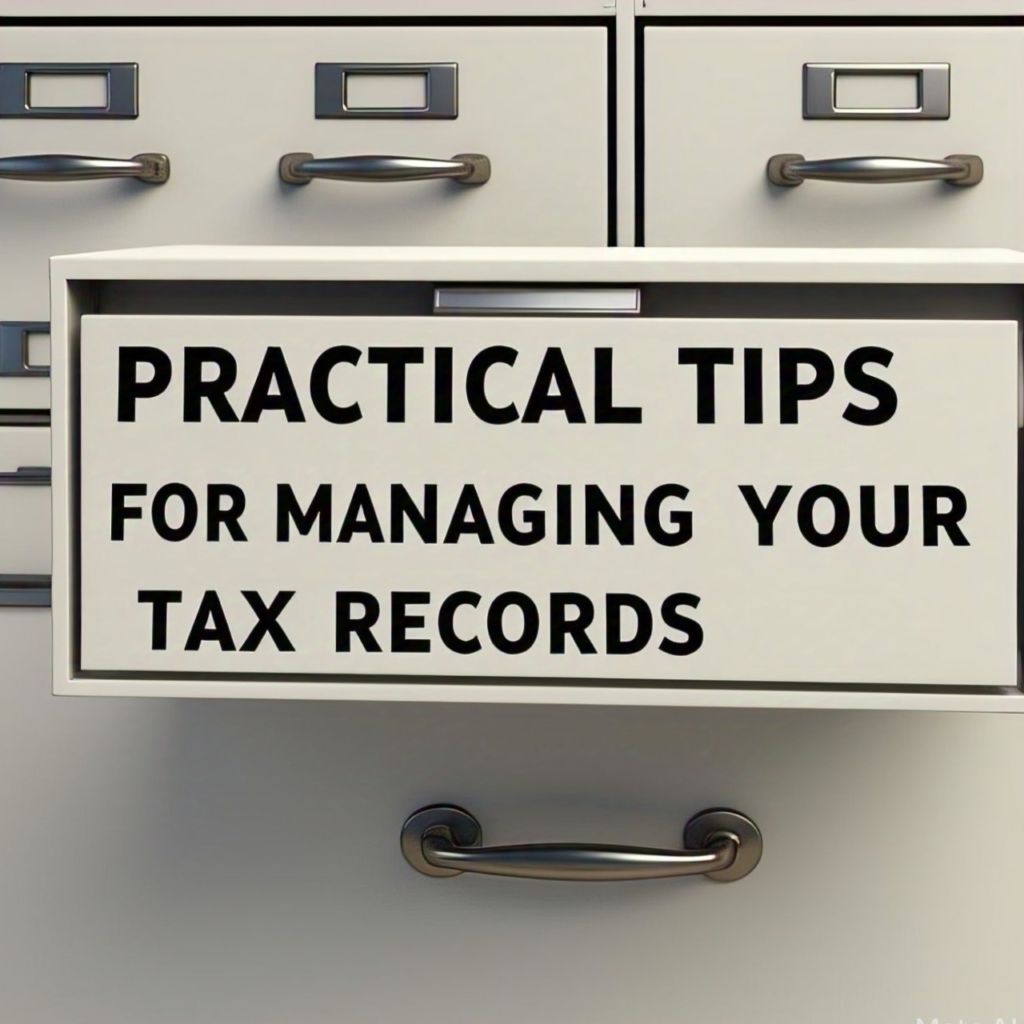
Implementing an effective tax record-keeping system requires careful planning and attention to detail. Here are some practical tips to help you manage your tax records efficiently:
1. Implement a Record-Keeping System: Develop a centralized system for storing and managing your tax records, including invoices, receipts, bank statements, and tax returns.
2. Categorize and Label Records: Organize your records into categories (e.g., income, expenses, assets) and label them clearly, making it easier to locate specific documents.
3. Maintain Accurate and Detailed Records: Ensure your records are accurate, complete, and up-to-date, including details such as dates, amounts, and descriptions.
4. Leverage Technology: Utilize cloud-based accounting software, such as QuickBooks or Xero, to streamline your record-keeping processes and improve accuracy.
5. Consult a Tax Professional: Collaborate with a qualified tax professional, such as a Canada tax expert or financial advisor in Ontario, to ensure your records meet CRA requirements and optimize your tax strategy.
6. Provide Training and Support: Provide training and support to business owners and employees on tax record-keeping procedures to ensure accuracy and completeness.
FREQUENTLY ASKED QUESTIONS
General Questions
1. Why is accurate business tax record keeping important?
A: Accurate business tax record keeping is crucial for ensuring compliance with tax laws, minimizing errors, and optimizing your business’s financial performance.
2. What are the consequences of inaccurate business tax record keeping?
A: Inaccurate business tax record keeping can lead to penalties, fines, audits, and reassessments, which can be costly and damage your business’s reputation.
3. How long should I keep my business tax records?
A: The Canada Revenue Agency (CRA) recommends keeping business tax records for at least six years in case of an audit or reassessment.
Record Keeping Questions
1. What types of records should I keep for my business?
A: You should keep records of all financial transactions, including invoices, receipts, bank statements, and tax returns.
2. How should I organize my business tax records?
A: You should organize your records in a centralized system, categorize them by type (e.g., income, expenses, assets), and label them clearly.
3. Can I use accounting software to manage my business tax records?
A: Yes, cloud-based accounting software, such as QuickBooks or Xero, can help streamline your record-keeping processes and improve accuracy.
Tax Questions
1. What tax deductions and credits can I claim for my business?
A: You can claim deductions and credits for business expenses, such as rent, utilities, and equipment, as well as for hiring employees and investing in research and development.
2. How do I report my business income and expenses on my tax return?
A: You should report your business income and expenses on the T2125 Statement of Business or Professional Activities, which is attached to your personal tax return.
3. Can I claim home office expenses on my tax return?
A: Yes, you can claim home office expenses, such as rent or mortgage interest, utilities, and equipment, if you use a dedicated space in your home for business purposes.
Consultation Questions
1. Should I consult a tax professional to help with my business tax record keeping?
A: Yes, consulting a qualified tax professional, such as a Canada tax expert or financial advisor in Ontario, can help ensure your records meet CRA requirements and optimize your tax strategy.
2. How often should I review my business tax records with a tax professional?
A: You should review your business tax records with a tax professional at least annually, or more frequently if you have complex tax situations or significant changes in your business.
3. What questions should I ask a tax professional during a consultation?
A: You should ask a tax professional about their experience with businesses like yours, their knowledge of tax laws and regulations, and their approach to tax planning and record keeping.
CONCLUSION
In conclusion, accurate business tax record keeping is a critical component of financial management for businesses operating in Canada. By maintaining precise and detailed records, businesses can ensure compliance with tax laws, minimize errors, and optimize their tax strategy.
Throughout this guide, we’ve explored the importance of accurate business tax record keeping, the benefits of maintaining precise records, and the common challenges and mistakes to avoid. We’ve also provided practical tips and best practices for implementing a robust record-keeping system, leveraging technology, and consulting with a tax Professional.
KEY TAKEAWAYS
1. Accurate business tax record keeping is essential for ensuring compliance with tax laws and regulations.
2. Maintaining precise records can minimize errors, reduce stress, and optimize your tax strategy.
3. Implementing a centralized record-keeping system, leveraging technology, and consulting with a tax professional can help ensure accurate and complete records.
4. Common mistakes to avoid include inaccurate or incomplete records, failure to maintain supporting documentation, and not seeking professional advice.
CALL TO ACTION
Take control of your taxes today by implementing accurate business tax record-keeping practices. Consult with a qualified tax professional, such as a Canada tax expert or financial advisor in Ontario, to ensure your records meet CRA requirements and optimize your tax strategy.
By prioritizing accurate business tax record keeping, you can:
– Minimize errors and reduce stress during tax season
– Optimize your tax strategy and maximize your refund
– Ensure compliance with tax laws and regulations
– Make informed financial decisions and drive business growth
Don’t wait until it’s too late. Take control of your taxes today and ensure a secure financial future for your business.
ABOUT
Shanel John is a dedicated Certified Public Accountant (CPA) at G.L.H. Accounting, specializing in Income Tax with 10 years of experience. Based in Brampton, Ontario, Canada, Shanel offers expertise in tax preparation, financial accounting, and advisory services. A certified QBO Pro Advisor, Shanel’s decade-long experience and knowledge make her a trusted figure in the accounting field.
ADDITIONAL RESOURCES
Government Resources
- Canada Revenue Agency (CRA): https://www.canada.ca/en/services/taxes/income-tax/business-or-professional-income.html
- 2. CRA’s Guide to Business Tax Records: https://www.canada.ca/en/services/taxes/resources-for-small-and-medium-businesses.html
3. Ontario Government’s Tax Credits and Benefits for Businesses: https://www.ontario.ca/page/business-income-tax

